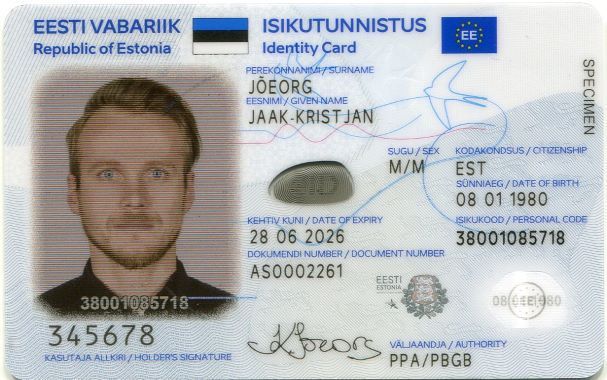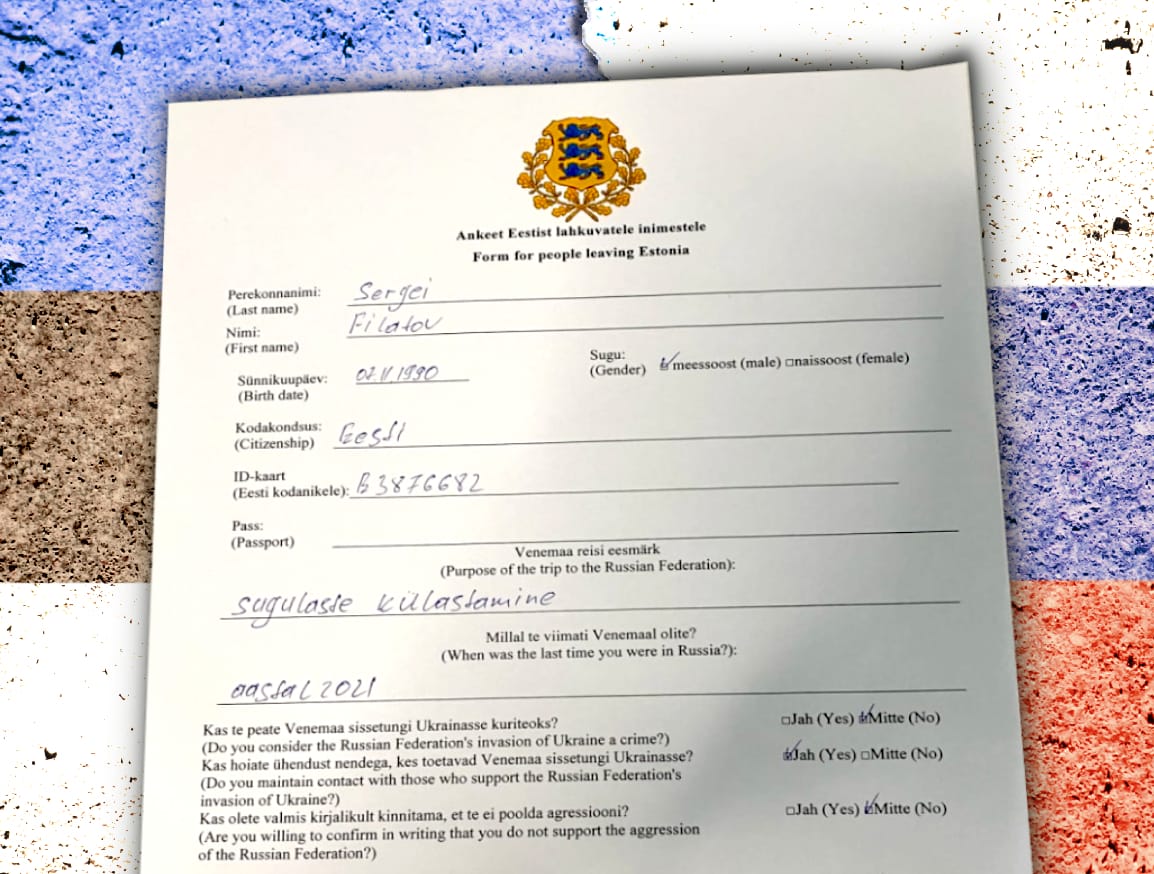A photo of a questionnaire for Russian residents of Estonia traveling to Russian territory has circulated on the Internet. The questionnaire allegedly contains questions about support for Russia’s “special military operation” in Ukraine. We checked whether such a form really exists.
A photo of the profile appeared in Telegram channels (“Solovyov", "Military observer", "Kovpak's detachment"), social networks, as well as in topic “Crossing the Estonia -> Russia border” on the popular travel forum “Vinsky Forum”. The photograph was allegedly shared by a Russian citizen of Estonia named Sergei Filatov, judging by the information he filled out. questionnaire. Along with a photograph of the questionnaire, he sent a story about his experience of crossing the Russian-Estonian border according to the “new rules”: “I have been living in Estonia for seven years, I have Estonian citizenship, I am originally from Tver. Once a year I regularly go to visit my relatives, this year I only got around to it now. There's a new questionnaire at the border. At the end there are a bunch of questions about my attitude towards SVO, how my relatives feel, do I communicate with those who support me, and so on. But the funny thing is that I have to return from the territory of the Russian Federation within 14 days, otherwise they will deprive me of my residence permit, and if you are a citizen, you will be fined €20,000.” Messages about the new profile also appeared in the English-language segment of Twitter, where users compared the Estonian government with the thought police from George Orwell's novel 1984.
In August 2022, Estonia complicated entry rules for Russians. Since August 18, it became almost completely limited entry for Russian citizens holding a valid Estonian visa obtained for the purpose of business or tourism. On the same day, a photo appeared of a form for leaving Estonia, which Russians permanently residing in Estonia and wishing to visit Russia are supposedly required to fill out. In the application form, the applicant must answer the following questions:
- Do you consider the Russian Federation's invasion of Ukraine a crime?
- Do you maintain contact with those who approve of the Russian Federation's invasion of Ukraine?
- Are you ready to confirm in writing that you do not approve of the aggression of the Russian Federation?
- Are you ready to renounce Russian citizenship?
- Are you ready to give up traveling to the Russian Federation?
Next comes a warning in Estonian and English with grammatical errors: “We hereby inform you that, according to Article 8 of the Constitution of the Republic of Estonia, if you leave the territory of the Russian Federation for 14 days or more without a valid reason, you will be punished with a residence permit or a fine of up to €20,000.” Apparently, the creator of this form meant that if a Russian does not return from Russia within 14 days, he will be deprived of his Estonian residence permit. At the same time, according to Sergei Filatov, the penalties will be different for residents and citizens of Estonia. A resident who fails to return within 14 days will be deprived of his residence permit, and if you are a citizen, you will be fined €20,000. Twitter user Bad Baltic Takes, who refutes misinformation about Estonia, Latvia and Lithuania, also indicated to numerous errors in wording in Estonian.
In addition to grammatical errors, a number of other signs indicate that the form was not created by an official body of Estonia. The header of the uniform uses the coat of arms of Estonia, not emblem Police and Border Guard Department. Moreover, it is strange that the form for Russian citizens is written in Estonian and English, and not in Russian. Many of Estonia's official websites are available in Russian, English and Estonian, including website Police and Border Guard Department.
In the fake application form, in the “ID-card” section, for some reason, instead of an English translation, there is an explanation in Estonian in parentheses: “ID-kaart (Eesti kodanikele).” At the same time, the ID card number indicated by Sergey Filatov (B3876682) does not correspond to the format of Estonian ID card numbers. IN real maps A seven-digit number is preceded by two letters rather than one (for example, AS0002261).

Also, if we refer to Article 8 constitution Estonia, mentioned in the last paragraph of the questionnaire, we will see that there is talk about the right to Estonian citizenship by birth and the illegality of deprivation of Estonian citizenship due to personal views. This article, like the rest of the text of the constitution, says nothing about visits of Estonian citizens to Russia.
Our fellow fact checkers from the Estonian publication Delfi contacted with the Estonian Police and Border Guard Department and asked to comment on the photo of the profile. Department speaker Ilmar Karo replied that such a form does not exist and cannot exist. To obtain real information about crossing the Russian-Estonian border, he advised contacting official website police.
Judging by the date of publication, the photo of the fake profile began to spread from post Russian Telegram channel “Ponomar”. There the questionnaire was published in full, without personal data filled in. An hour later, the same photo, but with the name and ID number blurred out, was posted by Komsomolskaya Pravda war correspondent Alexander Kots. True, ten minutes later he deleted his post. However, TV presenter Vladimir Solovyov managed to share it - the post received more than 240,000 views.
Thus, the application form for those leaving Estonia is a fake, probably created for propaganda purposes by a Russian pro-government anonymous Telegram channel.
Cover image: Telegram, Wikimedia Commons
Fake
Read on the topic:
- Is it true that the Polish questionnaire for Ukrainian citizens contains questions about Bandera and the Volyn massacre?
- Is it true that Gazmanov’s song was played at the Rammstein concert in Tallinn?
If you find a spelling or grammatical error, please let us know by highlighting the error text and clicking Ctrl+Enter.






